MercoPress. South Atlantic News Agency
Tag: Buenos Aires
-
Wednesday, December 16th 2020 - 09:48 UTC
Argentina has 1,510,203 Covid-19 positive cases and a death toll of 41,204
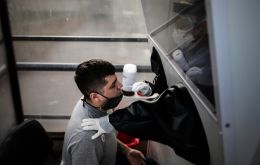
Argentina on Tuesday reported 6,981 new COVID-19 cases, bringing its national tally to 1,510,203, said the Ministry of Health. The ministry also said that 165 more patients died of the disease, raising the nationwide death toll to 41,204.
-
Friday, November 27th 2020 - 09:46 UTC
Maradona in life, as in death, involved in chaos and controversy: fans overwhelm and invade the presidential palace
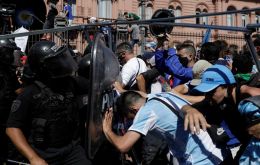
Diego Maradona in life, as in death, was involved in chaos and controversy, and his funeral was not the exception. In effect Argentine police and fans who were lined up to see the casket of the football icon clashed on Thursday as authorities moved to shut down access to the Casa Rosada presidential palace ahead of a planned mid-afternoon shutoff for the public wake.
-
Friday, November 27th 2020 - 08:49 UTC
Maradona buried next to his parents, amid a global outpouring of grief in the streets of Buenos Aires and Naples
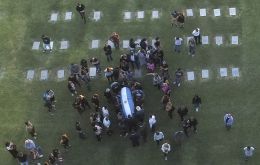
Argentina’s Diego Maradona, one of the world’s greatest ever soccer players, was buried on Thursday amid a global outpouring of grief from the streets of Buenos Aires to Naples in Italy.
-
Wednesday, October 28th 2020 - 08:40 UTC
Argentina and Pakistan sign MoU to promote trade and technological cooperation

Pakistan and Argentina signed a Memorandum of Understanding on Cooperation in Sanitary and Phytosanitary issues, during a ceremony conducted in Buenos Aires with the purpose of promoting and sponsoring trade in animals, plants, and by-products, as well as technical cooperation.
-
Tuesday, October 13th 2020 - 08:54 UTC
Coronavirus cases and deaths keep growing despite some 200 days of quarantine in Argentina
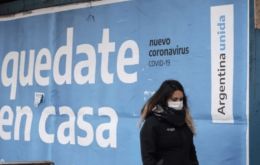
Argentina surpassed 900,000 cases of coronavirus on Monday, with strong growth of infections in large populated centers in the interior of the country after months of the virus' being concentrated in Buenos Aires City and its suburbs in the neighboring province of Buenos Aires.
-
Monday, October 12th 2020 - 09:15 UTC
Argentina approves growing GM drought resistant wheat; needs OK from its principal market, Brazil

Argentina has become the first country to approve the growth and consumption of genetically modified wheat, the country's agriculture ministry announced. The ministry's scientific commission said in a statement released in Buenos Aires that it had approved a drought-resistant variety of wheat in the world's fourth-largest exporter of the crop.
-
Saturday, October 10th 2020 - 09:20 UTC
Controversy in Buenos Aires City over live facial recognition to identify minors

Human Rights Watch wants the city of Buenos Aires to stop using live facial recognition to identify children accused of committing crimes, the rights group said on Friday. New York-based Human Rights Watch said Buenos Aires started using the technology in 2019, making Argentina the only country in the world to deploy it against people under the age of 18.
-
Thursday, October 8th 2020 - 09:03 UTC
Argentina: hogs from an overturned truck slaughtered in the highway by thieves

A truck carrying live pigs turned over in the Argentine province of Buenos Aires, and neighbors and other cars looted the cargo and in some cases slaughtered the animals in the highway. The accident took place in the access of Coronale Vidal, some 300 kilometers from the city of Buenos Aires.
-
Wednesday, September 9th 2020 - 09:02 UTC
Buenos Aires province police force, 90,000 strong, ceases activities demanding higher pay
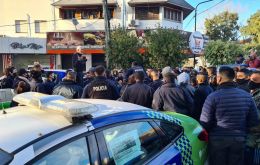
The police force from the province of Buenos Aires have ceased activities for the second day running on Tuesday to demand higher salaries and better working conditions for the beat in metropolitan Buenos Aires where criminality and insecurity are rampant.
-
Tuesday, August 25th 2020 - 09:30 UTC
Argentina confirms 8,713 new cases of Covid-19 and 381 deaths in the last 24 hours

Argentina confirmed a record 8,713 new cases of coronavirus on Monday and 381 resulting deaths in just 24 hours, as the country battles a surge of contagions. The country's health ministry said that just weeks into a stricter quarantine in the capital Buenos Aires and its suburbs, cases were now springing up in other regions of the country.
